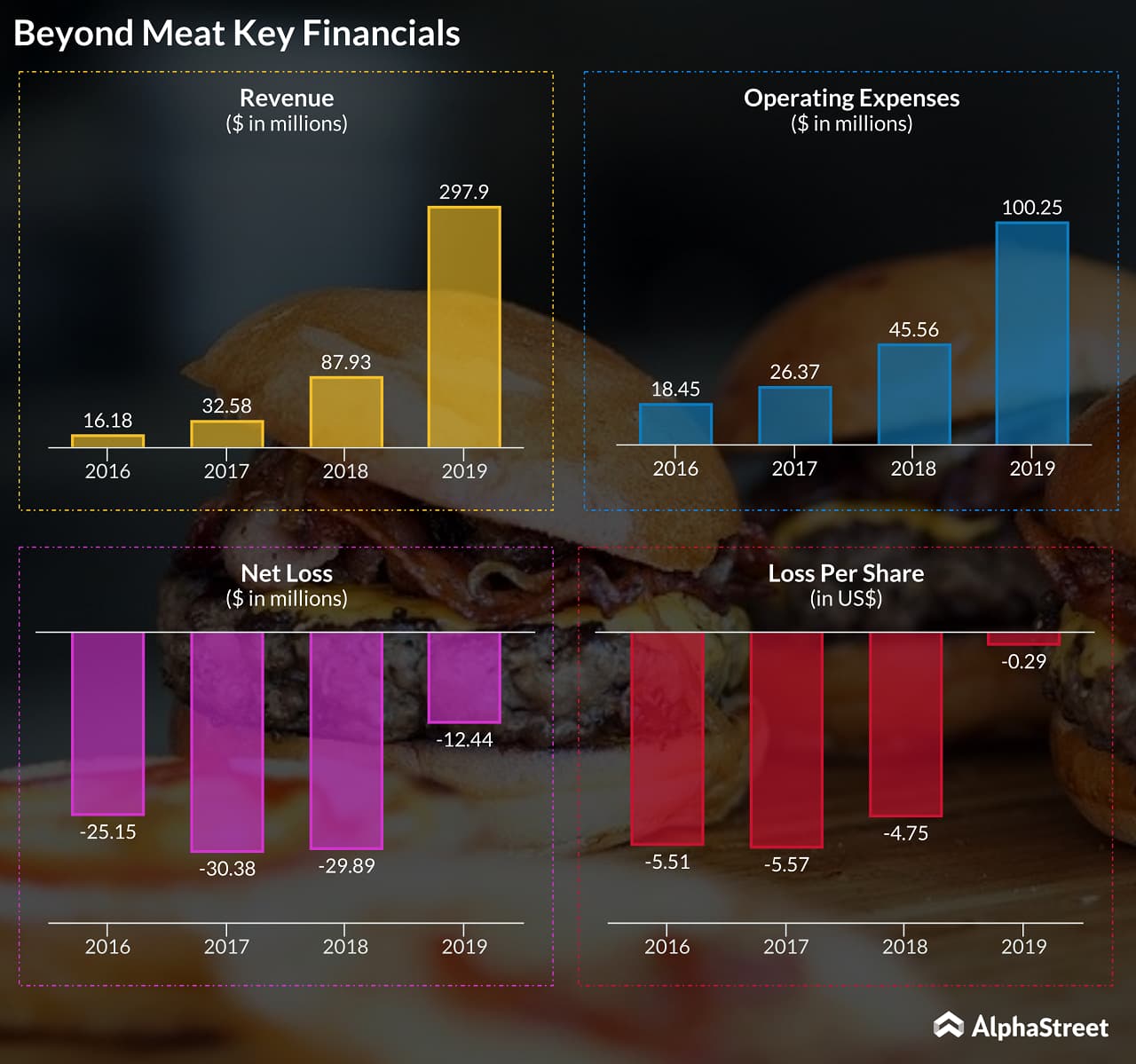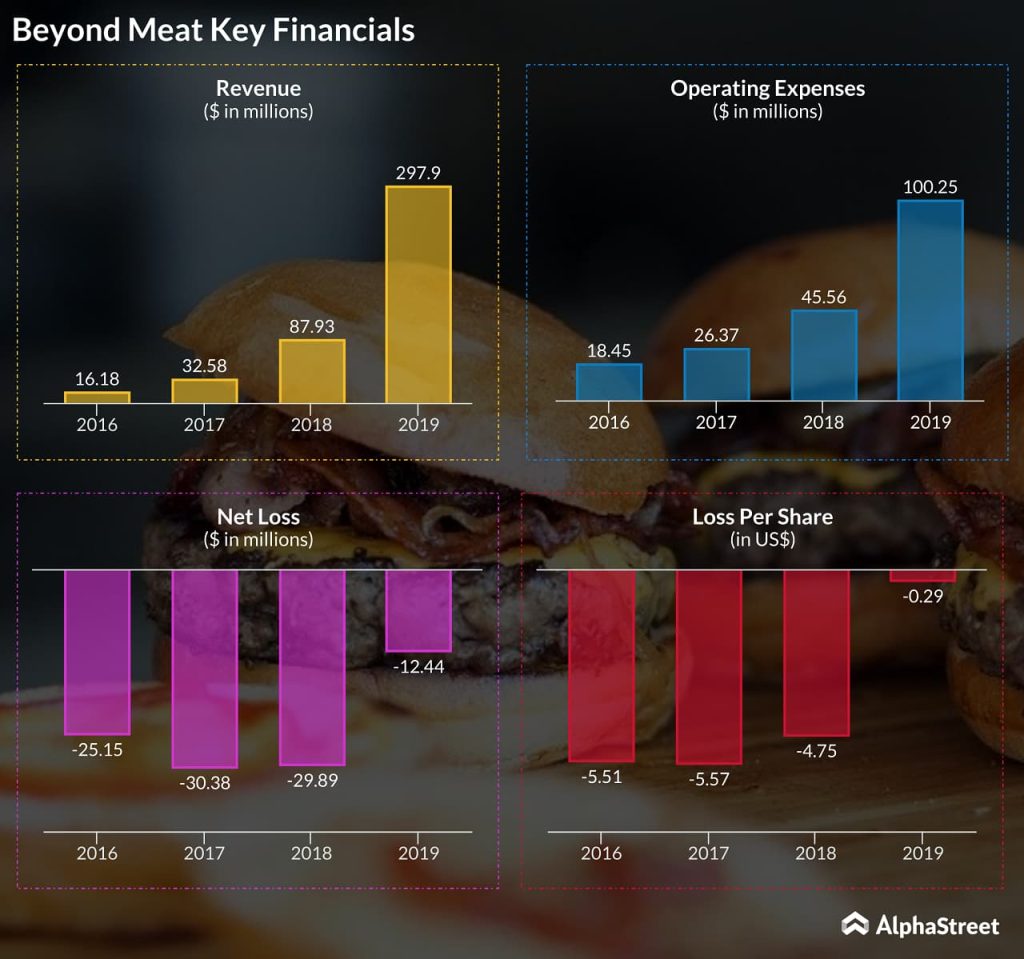Overview
Beyond Meat, which was founded in 2009 by Ethan Brown, became a public company in May 2019. The El Segundo, California-based company produces plant-based meat products. Beyond Burger, which simulates the taste of the beef burger, is the company’s flagship product. The company also manufactures other plant-based meat products such as Beyond Sausage, Beyond Beef, Beyond Breakfast Sausage, Beyond Beef Crumbles, Beyond Fried Chicken and Beyond Meatball.
Beyond Meat sells its products through grocery and convenience stores, natural retailer channels, direct to consumer channels, restaurants and foodservice outlets.
Meat industry market
According to the Food and Agriculture Organization of the United Nations, the world’s total meat production is projected to decline by 1.7% in 2020, mainly because of COVID-19-related market disruptions. Data and analytics company GlobalData has forecasted that the global meat market will retract 5.3% year-over-year to $1.3 trillion by the end of 2020.

Merits
Beyond Meat’s revenue has been rapidly growing over the past three years. Revenue doubled in 2017, jumped 170% in 2018 and surged 240% in 2019. The company is yet to become profitable. However, the loss more than halved to $12 million in 2019 compared to the prior-year loss of $29 million. After the year-over-year improvement in top and bottom line numbers, the company is expected to thrive well in the future.
Even though SG&A and R&D expenses have been increasing year-over-year, as a percentage of revenues, expenses are showing a declining trend. Debt stood as low at $30.5 million at the end of December 31, 2019.
The meat industry is the largest category of food. In 2019, Barclays had projected that the alternative meat industry could reach $140 billion by 2029, capturing 10% of the $1.4 trillion global meat industry.
[irp posts=”60684″]
According to Zion Market Research, the global plant-based meat market is expected to grow to
$21 billion in 2025 with a compound annual growth rate of 8.6%. The study says
that the Asia Pacific region is expected to hold a lion’s share of the global
plant-based meat market in the future, as more people in China and India have
stared preferring plant-based meat substitutes.
After the global pandemic, the number of people who started to consume vegan food has been increasing. And this has created an opportunity for plant-based meat producers like Beyond Meat to develop their business all over the world.
Other than North America and Europe, Beyond Meat has been taking strategic steps to increase its footprint in other parts of the world. The company partnered with coffee chain Starbucks (NASDAQ: SBUX) in China to sell its products. It also joined hands with a Chinese distributor Sinodis to unlock the distribution opportunities across retail and foodservice in China,
Potential risks
COVID-19 has created headwinds for all the food producers and Beyond Meat is no exception. The pandemic has resulted in lockdowns, stay-at-home orders, quarantines, and travel bans.
These restrictions have negatively impacted the global economy and consumer confidence and spending. Hence the supply, as well as the demand for Beyond Meat’s products are getting affected. Production and distribution of the products are also facing problems. Collectively, all these issues impact the business and financial conditions of the company.
[irp posts=”61043″]
Beyond Meat relies on a limited number of third-party suppliers for the raw materials. The company gets pea proteins from three suppliers. If there is any disruption in getting pea protein from these suppliers, the production will get affected. The company also competes with other food producers in the purchase of raw materials.
Beyond Meat’s business might be affected because of the intense competition. The company competes with few plant-based food producers, conventional animal-protein companies and large food operators. The list includes Impossible Foods, Hormel Foods (NYSE: HRL), Tyson Foods (NYSE: TSN), and many more.
The change in consumer
perception might affect Beyond Meat’s business negatively. People who consume
animal meat argue that the nutritional value which they get from animal meat cannot
be matched with that of plant-based meat products.
Final verdict
It’s certain that COVID-19 will disrupt Beyond Meat in the rest of 2020. Even though some risks drag down Beyond Meat’s business, the merits listed out here might give long-term investors the confidence to buy the stock.
DISCLAIMER: This article does not necessarily imply the views of AlphaStreet, and contains opinions of the author alone.
